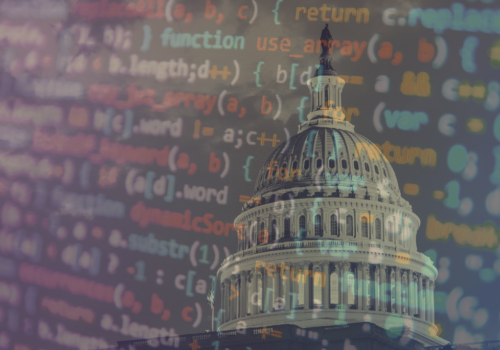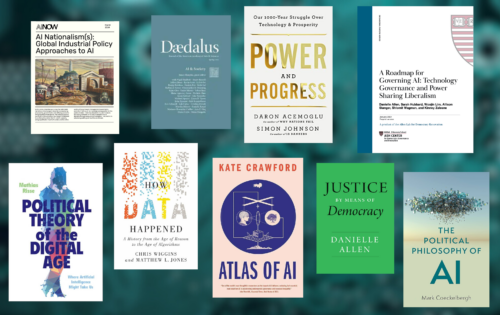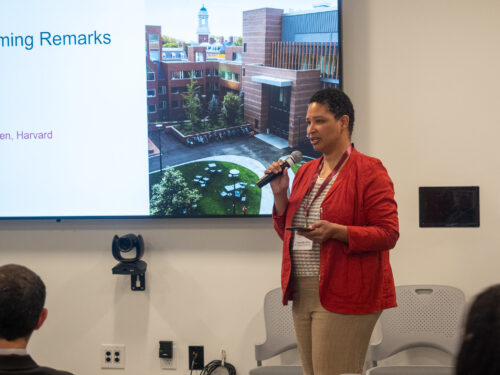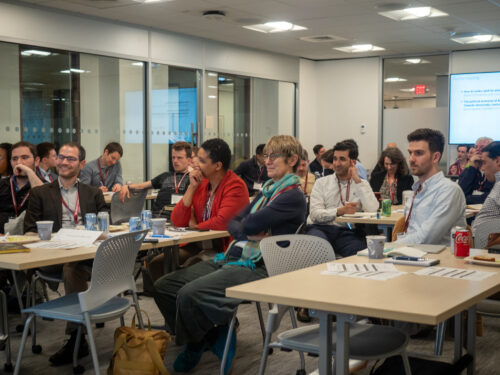
Podcast
Conference on the Political Economy of AI Podcast Episodes
Check out the podcast episodes from the Allen Lab for Democracy Renovation’s Conference on the Political Economy of AI to glean insights from each panel.
Understanding the promises and perils that AI holds for the future of our democracy
Allen Lab for Democracy Renovation, GETTING-Plurality, Reimagining Democracy Program
The proliferation of artificial intelligence has the potential to upend our democracy — for better or worse.
AI tools could allow for new forms of participation while at the same time facilitating the spread of misinformation. As regulators and policymakers struggle to understand the implications of this new technology, Ash Center experts are answering questions about how best to govern AI and not just reactively respond to the many issues that continue to arise.
Can AI be a force for good in our democracy? How do we prevent it from becoming a tool for those who wish to undermine our institutions and trust?
Explore our latest events, research, and writing below.
Podcast
Check out the podcast episodes from the Allen Lab for Democracy Renovation’s Conference on the Political Economy of AI to glean insights from each panel.
Commentary
Will AI-assisted polls soon replace more traditional techniques?
Feature
This list, curated by the GETTING-Plurality Research Network at the Allen Lab for Democracy Renovation, highlights a mix of foundational texts and new thinking on the timely issue of how AI will impact democracy, especially as we head into election season.
Feature
Experts gathered at the Allen Lab conference to examine the incentives and structures of AI development, as well as to discuss the past, present, and potential future of steering AI towards better serving the public interest.
Feature
From misinformation to AI panic, experts joined the Allen Lab’s GETTING-Plurality event to discuss the threats the burgeoning technology poses to democracy.
Video
The GETTING-Plurality Research Network at the Ash Center’s Allen Lab and Connection Science at MIT Media Lab hosted a webinar event focused on “AI and the 2024 Elections”. In this session, we hear from Danielle Allen, Harvard University; Sandy Pentland, Massachusetts Institute of Technology; and Nate Persily, Stanford University. Each presenter gives a lightning talk, followed by audience Q&A.
Video
The Political Economy of AI Conference was convened by the GETTING-Plurality Research Network, a project of the Allen Lab for Democracy Renovation, housed at the Harvard Kennedy School’s Ash Center for Democratic Governance and Innovation.
Additional Resource
GETTING-Plurality Research Network members Allison Stanger and Woojin Lim, along with other authors, published “Terra Incognita: The Governance of Artificial Intelligence in Global Perspective” in the Annual Review of Political Science.
Video
The GETTING-Plurality Research Network at the Ash Center’s Allen Lab and Connection Science at MIT Media Lab hosted a webinar event focused on “AI and the Future of Privacy”. In this session, we hear from Bruce Schneier, security technologist, and Faculty Affiliate at the Ash Center; Sarah Roth-Gaudette, Executive Director of Fight for the Future; and Tobin South, MIT Ph.D. Candidate and Fulbright Scholar. Each presenter gives a lightning talk, followed by audience Q&A.
Policy Brief
We face a fundamental question: is the very pursuit of Artificial General Intelligence (AGI) the kind of aim democracies should allow?
Additional Resource
This essay was adopted from a presentation given by Aviv Ovadya at the Second Interdisciplinary Workshop on Reimagining Democracy held on the campus of Harvard Kennedy School in December 2023.
Additional Resource
This essay was adopted from a presentation given by Nathan Schneider at the Second Interdisciplinary Workshop on Reimagining Democracy held on the campus of Harvard Kennedy School in December 2023.
Additional Resource
“The Real Dangers of Generative AI” by Danielle Allen and Glen Weyl was featured in the January 2024 Journal of Democracy.
Abstract: As perhaps the most consequential technology of our time, Generative Foundation Models (GFMs) present unprecedented challenges for democratic institutions. By allowing deception and de-contextualized information sharing at a previously unimaginable scale and pace, GFMs could undermine the foundations of democracy. At the same time, the investment scale required to develop the models and the race dynamics around that development threaten to enable concentrations of democratically unaccountable power (both public and private). This essay examines the twin threats of collapse and singularity occasioned by the rise of GFMs.
Occasional Paper
Video
The “Advancements in Global AI Policy” webinar featured the following speakers and topics:










